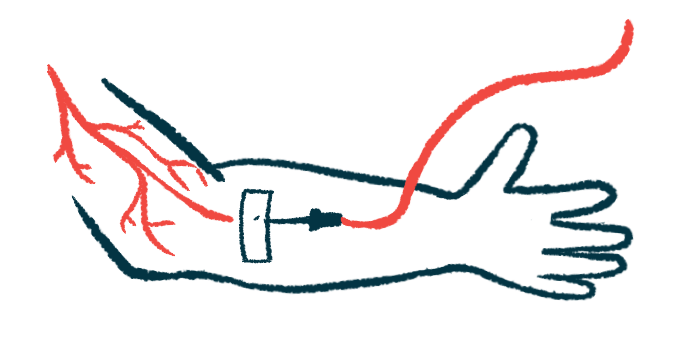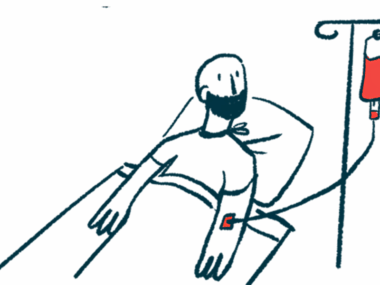Vyvgart safe, effective in hard-to-treat gMG, real-world study finds
Therapy's use urged for patients not helped by first-line treatments
Written by |

Vyvgart (efgartigimod) generally is safe and leads to both significant symptom reductions and improvements in function in people with hard-to-treat generalized myasthenia gravis (gMG), according to a real-world, single-center study in the U.S.
These results, the researchers say, “[provide] further support for the use of [Vyvgart] in clinical practice for gMG.”
“We suggest considering the use of [Vyvgart] in those patients who are refractory [resistant] to first line therapies, have side effects to their current treatments, and/or require quick improvement in their symptoms,” the scientists wrote.
Further, Vyvgart could be used “as a bridge therapy while waiting for steroids-sparing agents to become effective,” the team wrote.
Their study, “Single institution experience with efgartigimod in patients with myasthenia gravis: Patient selection, dosing schedules, treatment response, and adverse events,” was published in the journal Muscle & Nerve.
Vyvgart’s effectiveness seen in trial, but unknown in real-world setting
An autoimmune disease, myasthenia gravis (MG) is characterized by the production of self-reactive antibodies that mistakenly attack proteins important for the function of the neuromuscular junction — the point of near-contact between nerves and muscles where they communicate.
Vyvgart, an approved therapy for gMG developed by Argenx, is designed to lower the levels of disease-driving self-reactive antibodies. It works by blocking the neonatal Fc receptor, a protein that normally helps to stabilize and prevent the breakdown of antibodies circulating in the bloodstream.
Patients initially receive weekly hour-long intravenous, or into-the-vein, infusions of Vyvgart over the course of four weeks. Additional treatment cycles are given as needed based on a patient’s response.
The therapy’s approval was supported by data from the Phase 3 ADAPT trial (NCT03669588), which tested Vyvgart against a placebo when given on top of standard of care treatment. The study, spanning about six months, involved 167 adults with gMG.
The results showed that Vyvgart was well tolerated, and more effective at easing gMG symptoms than was the placebo.
However, the treatment’s effectiveness outside clinical trials remained largely unknown. Also, scant information was available regarding side effects and treatment compliance in the clinical setting.
To shed light on this, a team led by researchers at the University of Pennsylvania (UPenn) reviewed the clinical history of 17 gMG patients treated with Vyvgart between January 2022 and June 2023 in UPenn’s neuromuscular division. The mean age of the 10 men and seven women was 62, and 65% of them were white individuals.
Before starting on Vyvgart, most patients (82%) were on prednisone, a corticosteroid. About two-thirds were receiving intravenous immunoglobulin, known as IVIG, which is a procedure to neutralize MG-driving antibodies.
Despite such treatment, the patients showed marked functional impairments, as demonstrated by a mean score of 9.1 on the MG Activities of Daily Living (MG-ADL) scale.
That scale evaluates the impact of MG on a patient’s ability to perform daily activities. Each item in the MG-ADL scale is scored from 0 to 3, providing a total score ranging from 0 to 24 points, in which a higher score indicates greater MG impact.
More than half of the patients (53%) also were categorized as class III in the MG Foundation of America classification, indicating moderate weakness.
Improvements in daily living activities seen with Vyvgart in clinical practice
Vyvgart was started in the patients for three primary reasons: due to poor response to prior treatments (82.4%); failure to respond to conventional therapies (70.6%); and/or side effects or contraindications to prednisone, steroid-sparing treatments, or IVIG (76.5%). Steroid-sparing treatments are those that aim to minimize the side effects of steroid use among patients.
Two patients had failed to respond to a large number of therapies, including Soliris (eculizumab) and/or rituximab. A cancer treatment used off-label in MG, rituximab works by killing antibody-producing immune B-cells.
All patients started Vyvgart as an infusion administered once a week for four weeks. Nearly two-thirds (64.7%) received additional treatment cycles four weeks after the last dose. The remaining six patients (35.3%) were dosed as needed based on symptoms.
Physician notes were used to obtain data on clinical response, prednisone dose, and side effects at three and six months after starting Vyvgart.
A total of 13 patients (76.5%) reported a reduction in symptoms after starting Vyvgart. For the 15 patients (88%) still on Vyvgart after three months, MG-ADL scores showed a significant mean reduction of 5.5 points.
All but one of these 15 patients had a clinically meaningful MG-ADL score reduction, defined as a drop of two or more points. Three of these patients had minimal symptoms (MG-ADL score of zero to 1).
Data from the 12 patients (70.6%) who received Vyvgart for at least six months showed that more prolonged treatment led to even greater reductions in the MG-ADL score (a 7.1-point drop), with patients reaching a mean score of 1.7.
Clinically-meaningful MG-ADL score reductions were detected in all but one of these patients, and seven showed minimal symptoms.
[Vyvgart] should be considered as an add-on therapy, a bridge therapy, or as a [single therapy] if patients have difficulty tolerating other treatments.
All patients on steroids at the start of Vyvgart treatment also were to reduce their daily dose of steroids during the study period. The mean daily prednisone dose was significantly decreased after six months of treatment, reaching an average of 15.9 mg. In five patients, the dose was 10 mg or lower at six months.
Five patients (29.4%) discontinued Vyvgart after a mean of five months: four due to poor response, and one due to preexisting pancreatic cancer that led to the individual’s death.
Vyvgart generally was well-tolerated, without reports of treatment-related serious adverse events. Adverse events were reported in slightly more than 40% of patients, the most common being mild infection (urinary tract infection and thrush) that resolved with appropriate antimicrobials.
Overall, “this study found [Vyvgart] to be efficacious, well tolerated, and safe in patients with MG,” the researchers wrote.
They added that Vyvgart “should be considered as an add-on therapy, a bridge therapy, or as a [single therapy] if patients have difficulty tolerating other treatments.”




Leave a comment
Fill in the required fields to post. Your email address will not be published.